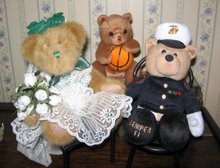RANDOM PASSAGE
That's Random Passage, Canadian/Irish miniseries about tough life on the Newfoundland rock in 1805. The production dates to 2000
 , but I finally got around to watching it, but not without perils. Had to crank up the VHS machine -- that was a comedy.
, but I finally got around to watching it, but not without perils. Had to crank up the VHS machine -- that was a comedy.Not a bad series so far, but not exactly a page-turner yet either. And turning the page on this one means that I have to jam in cassette #2 and then rewind it for an eternity because in my early attempts to get the machine to work I thought maybe the cassettes were faulty and put in two different ones, then pushed all the buttons to see if it would do ANYTHING. I finally figured out that my machine was so cheap, its counter function only counted minutes and not seconds, which is why it was moving so slowly. So glad I have this ancient artifact to show my grandchildren one day, and they can see how, in order to watch videos, we had to walk barefoot five miles in the snow, etc.
Back to Totally Random mode.
THINGS ARE LOOKING UP
FOR THE BRITISH MONARCHY

The Prince and Princess, the Duke and Duchess, Wills and Kate made a grand splash in their Canadian touchdown, and then went on to charm selected U.S. cities. A very impressive couple -- and if they keep doing this, they will make it impossible for Charles and his Duchess to mount the thrones. This young man appears to be the real thing, and has chosen a woman of modesty and grace to be at his side. (She has no hips, sporting the alarming tubular figure of the modern girl, but one hopes that the heir and the spare will fix that. Give the girl sandwich, please!)
Nice first outing, kids. The family business may well survive another generation.
WHO THE HELL CAST PAUL GIAMATTI AS JOHN ADAMS?
Just finished another mini-series, John Adams -- not as good as touted, but entertaining with satisfying historically authentic trappings (right down to the bad teeth -- could have done without that). Laura Linney (political ninny) is quite fine as Abigail, as are many others in the cast, but Giamatti is largely ridiculous as John, only occasionally rising above his actorly instinct for caricature, and generally failing to grasp the persona of a colonial gentleman. Listening to him talk about the role in the documentary section is simply cringeworthy, but explains why he falls short in his attempt to draw this rich and complex personality on film.
As for accuracy on the events of history (what should have been the real TEETH of the show), I defer to those more knowledgeable than myself, and I am not surprised to find a reliable voice courting apoplexy as he tries to give the briefest of catalogues of the sort of pointless innaccuracies permitted in the TV telling of this tale. [Jeremy Stern, doctoral candidate at Princeton, blows off steam over at the History News Network.]
It is a sad thing when the half-educated of Hollywood apply their first-rate artistic and technological skill sets while lacking the ability to discern the most common lesson of all historical film-making: that truth is not only stranger than fiction, it is usually much more interesting, moving, and dramatic. Will they never learn?
Historian David McCullough, on whose well-respected work this series was ostensibly based, reported himself to be thrilled with its authenticity. What was he smoking?
More likely, he was just inhaling the rarified vapors given off by Hollywood glamor in action, while being guru-gushed by Tom Hanks, who flattered his eminent grey head off. I fully agree with Stern that there is not only mindless disinformation in this film, but flagrant injustice to any number of characters, most especially its putative heroine, Abigail Adams, who is snuffed out with no reference made to her instrumental role in re-establishing ties with their estranged friend Thomas Jefferson; injury is likewise done to Adams' cousin Samuel, whose violent revolutionary impulses and opposition to John early in the film are sheer fantasy.
And poor John Dickinson, delegate from Pennsylvania (and life-long public servant in one capacity or another) fares only slightly better in 8 television hours than he did in a couple of hours of the lightweight musical 1776. In the latter he is a cardboard villain representing the extremely wealthy, and suffers the indignity of having one of his particular contributions to the Declaration of the Causes and Necessity of Taking Up Arms of 1775 [that Americans were "resolved to die free men rather than live slaves"] called "magnificent" by Adams but attributed to Thomas Jefferson, Dickinson's co-writer (a fact never acknowledged in the musical since that would mess up his role as primo villain). He is more sympathetically portrayed in the miniseries, though, again, chronology is distorted to make him look bad, when he was actually a much-loved and admired man.
As for Giamatti, he uses the word "weird" a lot to describe both his character and the times, which shows at just what level he is operating. He brings to the role a lot of tension and a symphony of facial ticks, but it is difficult to take him seriously at the best of times. He also has one problematic feature, not his fault, but which renders him unsuitable to carry off the personage of John Adams: he has the puffy features and burly figure of a peasant. When he gets incensed or passionate, his bulging eyes get rhumy but never piercing, and he tries to make up for it by giving us major lip tremor, which does double duty when he's grieving. Doesn't cut it.
Adams may not have been an early American "aristocrat" in his family lineage, but all his many portraits show him to have been a man of "fine" facial features, those of a gentleman of good British "stock" -- a difference which would not have escaped his confreres in Congress, nor did it escape me. Presumably, farmer though he was, I suspect he had the gentlemanly carriage to go with the face. Giamatti has neither, and physically, I didn't buy him as Adams for one minute.




The series also had the problem of casting people who were too old for their characters at the beginning -- my sense was they were trying to find faces that resembled the real dudes, but they should have counted on the wonders of aging make-up to make younger actors older, rather than the usually unsuccessful reverse. David Morse looked fabulously George Washington, but he was 60 when he should have been 45.


[left: young Washington, 1772, in the uniform of pre-revolutionary Colonel Washington, not that of the Continental Army as seen mistakenly in the series, in the mid-1770's]


[left: 1795 portrait that was model for series image all the way through]
Then there's Benjamin Franklin. The tall, wiry, and craggy-faced Tom Wilkinson was another downright odd casting choice. Paul Giamatti, in fact, bears a very credible resemblance to Franklin, who prided himself on his peasant roots, had a puffy face, good-sized nose, and hooded eyes. Sigh. This is what happens when people fail to consult me on such important matters.


Hey! This is such bullsh&t!
I am a SO serious actor, babe!
[postscript: By way of explanation, Laura Linney is a political ninny because, when accepting an Emmy for some aspect of this production, she paid tribute to the Founding Fathers as "community organizers." It was 2008, and the Annointed Community Organizer from Chicago was poised to become President. To call it the "Silly Season" is to trivialize the monumental foolishness of 51% of the voters.]
A beautiful day in Newfoundland is passing, so I must close here. More interesting "separated at birth" photo pairs to come.

















